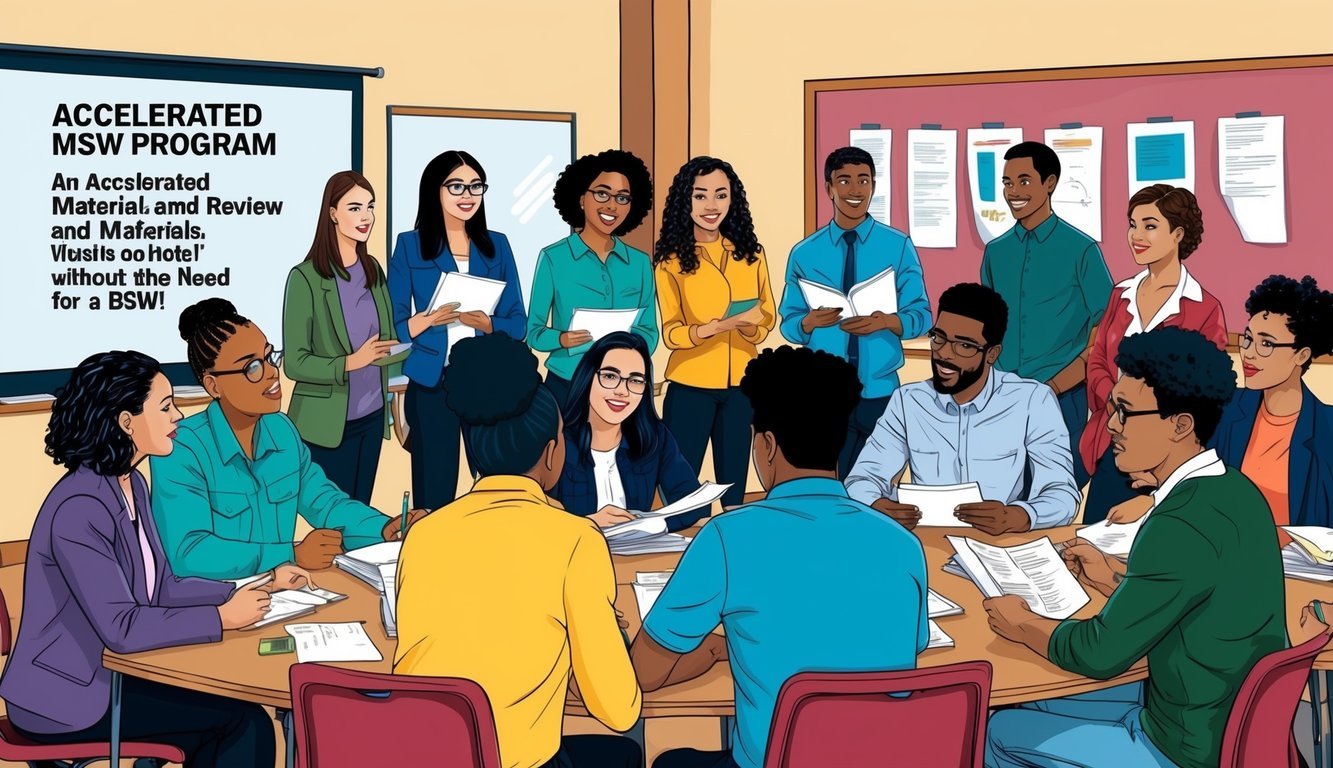Accelerated Master of Social Work (MSW) programs offer a fast track to earning your degree, even if you don’t have a Bachelor of Social Work (BSW). These programs typically take 12 to 18 months to complete, allowing you to enter the social work field more quickly. Many universities provide these options, making it easier for you to pursue a rewarding career in social work.
To enroll in these programs, you typically need a bachelor’s degree in a related field and meet specific admission requirements.
It is essential to understand the curriculum, which focuses on core social work principles and prepares you for various specializations.
With the right program, you can build the skills needed to make a significant impact in your community.
When considering an accelerated MSW program, think about the career options and licensure requirements.
A well-chosen program can lead you to fulfilling roles in social work, helping populations in need while advancing your professional journey.
Key Takeaways
- Accelerated MSW programs can be completed without a BSW degree.
- Programs often focus on both core and specialized social work education.
- Completing an MSW opens various career paths in social work.
Understanding Accelerated MSW Programs

Accelerated Master of Social Work (MSW) programs offer a fast track to obtaining your degree.
These programs provide an efficient way to break into the social work field, especially if you do not have a Bachelor of Social Work (BSW).
You may find flexible options that fit your schedule, allowing you to earn your degree in less time than traditional pathways.
Defining Accelerated MSW
Accelerated MSW programs are designed for students who want to earn their degree quickly.
These programs typically take one to two years to complete, depending on the school’s structure.
You can attend classes year-round, including summer sessions, which allows you to progress faster than in traditional programs.
To apply, you generally need a bachelor’s degree in any field.
Admission standards may include a minimum GPA and submission of a personal statement, transcripts, and letters of recommendation.
The curriculum covers essential topics in social work education, including ethics, human behavior, and social welfare policies.
Traditional MSW vs Accelerated MSW
The main difference between traditional MSW programs and accelerated MSW programs is the duration and pace of study.
Traditional programs usually take two years or more, requiring students to complete a BSW beforehand.
In contrast, accelerated MSW programs allow students without a BSW to work toward their degree in a shorter time frame.
| Feature | Traditional MSW | Accelerated MSW |
|---|---|---|
| Duration | 2 years or longer | 1 to 2 years |
| BSW Requirement | Typically required | Not required |
| Class Schedule | Often part-time options | Full-time or intensive options |
| Focus | In-depth social work studies | Fast-paced learning |
Both types of degree paths ultimately lead to a Master of Social Work, which qualifies you for various roles in social services.
Choose the one that best fits your educational background and career goals.
Curriculum and Structure

The curriculum for accelerated MSW programs without a BSW combines foundational courses with advanced studies.
This structure prepares you for real-world social work practice, ensuring you gain the necessary knowledge and skills.
Coursework Requirements
In accelerated MSW programs, coursework typically requires 48 to 60 credit hours.
You will take a mix of foundational and advanced courses over the program.
Foundational courses cover topics like social work history, ethics, and human behavior.
Advanced coursework delves into specialized areas such as clinical practice, community organization, and policy.
You may also focus on specific populations or social issues, depending on your interests and career goals.
This integrated approach supports the development of a comprehensive understanding of social work.
Foundational and Advanced Studies
The program usually begins with foundational coursework that establishes essential social work principles.
Subjects include:
- Human Development
- Social Policy
- Research Methods
These courses build your understanding of the profession.
You will then move on to advanced coursework that includes specialized programs.
Advanced topics might cover:
- Clinical Interventions
- Group Work
- Cultural Competence
This two-phase approach equips you with both broad knowledge and specialized skills.
Fieldwork and Internship Essentials
Fieldwork is a vital component of your MSW education.
Programs typically require a clinical internship that allows you to apply your learning in real settings.
The fieldwork often comprises about 900 to 1,200 hours, depending on the program.
Internships can take place in various settings, such as:
- Community Organizations
- Hospitals
- Schools
During your internship, you will gain hands-on experience.
You will work under the supervision of a licensed social worker, which ensures you receive valuable feedback.
Completing this requirement prepares you for the challenges of modern social work practice.
Admissions and Prerequisites

When considering accelerated MSW programs without a BSW, it’s essential to understand the specific admission criteria and available alternatives to the BSW requirement.
Knowing these details can help streamline your application process and set you up for success.
Evaluating Admission Criteria
Most accelerated MSW programs have specific admission criteria that you must meet to be considered for enrollment.
Common requirements often include:
- Bachelor’s Degree: You should hold an accredited degree from any field.
- GPA: Many programs require a minimum GPA, often around 3.0 on a 4.0 scale.
- Letters of Recommendation: Typically, you need at least two letters from academic or professional references.
- Personal Statement: A personal statement outlining your career goals and reasons for pursuing the MSW is usually required.
- Resume/CV: You might need to submit a current resume that highlights relevant work or volunteer experience.
Be sure to check the specific requirements of each program, as they can vary.
For more information on CSWE-accredited programs, visit the Council on Social Work Education.
BSW Requirement Alternatives
For students without a Bachelor of Social Work (BSW), many MSW programs offer alternatives for admission.
Here’s what you should know:
- Any Bachelor’s Degree: Some programs accept students with any accredited bachelor’s degree. This opens doors for a diverse range of candidates.
- Prerequisite Courses: You may need to complete specific courses, such as sociology or psychology, to qualify for the program.
- Work Experience: Relevant work or volunteer experience in social work can strengthen your application, showing commitment to the field.
- Non-Academic Strengths: Programs may consider unique experiences or skills that demonstrate your potential as a social worker.
Always confirm with the program’s admissions office for specifics.
Many programs are designed to help you transition smoothly into social work, even without a BSW.
Career and Licensure Considerations

Pursuing an accelerated MSW program without a BSW opens up various career paths and licensure options.
Understanding these aspects is crucial for your future in social work.
Licensure Pathways
To practice as a licensed social worker, you typically need to complete the MSW degree and pass a licensure exam.
The most common license is the Licensed Master Social Worker (LMSW).
After gaining clinical experience, you can pursue the Licensed Clinical Social Worker (LCSW) designation, which allows for private practice and advanced clinical roles.
Key Steps for Licensure:
- Complete accredited MSW program.
- Pass the ASWB licensure exam.
- Fulfill supervised work experience requirements.
- Apply for state licensure.
Different states have distinct requirements, so check with your state’s regulatory board for specific details.
Job Prospects and Earning Potential
With an MSW, your career options expand significantly.
You can work in various settings, including healthcare, schools, or private practice.
Social workers are in demand, especially in clinical and community roles.
Average Salaries for Social Work Positions:
| Position | Average Annual Salary |
|---|---|
| Licensed Clinical Social Worker | $62,310 |
| Healthcare Social Worker | $62,310 |
| Child and Family Social Worker | $54,880 |
| School Social Worker | $59,310 |
These figures reflect the potential earning power you can expect based on your role and experience.
The demand for qualified social workers continues to grow, enhancing your job prospects significantly.
For more information on licensure and careers, visit sites like the National Association of Social Workers.
Institutions Offering Accelerated MSW Programs
Accelerated Master of Social Work (MSW) programs can be found at various institutions, both online and on-campus.
These programs provide a quick path for students, especially those without a Bachelor of Social Work (BSW), to enter the field.
Here are some notable options.
Notable Online and On-Campus Programs
Baylor University offers an accelerated MSW program that is designed to be completed in as little as one year.
This program is fully online and CSWE accredited, making it an excellent option for those looking for a fast-paced learning environment.
The University of Southern California (USC) has a well-known accelerated online MSW program.
Students can choose either a traditional or advanced standing path.
This program emphasizes data analysis and real-world applications, preparing you for various social work scenarios.
Many institutions, including USC and Baylor, provide a range of online courses to enhance the learning experience.
Additionally, online accelerated MSW programs often allow for flexible scheduling, which can be beneficial for working professionals.
Consider these institutions as you research pathways to accelerate your social work career.
Frequently Asked Questions

This section addresses common questions regarding accelerated MSW programs for students without a Bachelor’s in Social Work.
You will find important details about enrollment requirements, program duration, costs, and accreditation.
What are the requirements for enrolling in an accelerated MSW program without a BSW?
To enroll in an accelerated MSW program without a BSW, you typically need a bachelor’s degree in any field.
Schools often require a minimum GPA, personal statements, letters of recommendation, and transcripts.
Some programs may also ask for relevant work or volunteer experience in social services.
How long does it typically take to complete an accelerated MSW program for students without a Bachelor’s in Social Work?
Accelerated MSW programs for students without a BSW usually take 12 to 18 months to complete.
This is shorter than traditional programs, which can take two to three years.
The duration may vary based on the program’s structure and your course load.
Are there any online MSW programs that allow for accelerated completion without a BSW?
Yes, there are several online MSW programs that offer accelerated completion for students without a BSW.
These programs provide flexibility while maintaining a rigorous curriculum.
You can find a list of such programs here.
What is the cost range for accelerated or 1-year MSW programs offered online?
The cost for accelerated online MSW programs can range from $487 to $1,995 per credit hour.
Total tuition often falls between $30,000 and $80,000, depending on the institution and the length of the program.
Be sure to research different programs for specific tuition rates.
How competitive are accelerated MSW programs for applicants without a BSW?
Accelerated MSW programs can be quite competitive.
They attract a diverse pool of applicants, so you’ll need to stand out.
Highlight your strengths in your application to enhance your chances of admission.
What kind of accreditation should I look for when choosing an accelerated online MSW program?
When choosing an accelerated online MSW program, look for programs accredited by the Council on Social Work Education (CSWE).
Accreditation ensures that the program meets high educational standards.
This can be important for your future job prospects and eligibility for licensure.

